Last edit: 05-03-17 Graham Wideman
| Last edit: 05-03-17 Graham Wideman |
Personal |
| Electronics Today International Magazine '78 Article created: 98-06-01 |
1978: The year that personal computers graduated from S-100 to neatly packaged products. We got first dibs on some of these units!
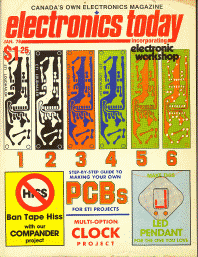 Since we printed our PC board patterns on separate pages with nothing on the reverse side, you could use the patterns to directly expose photo-sensitive PCBs. Hard work, but you could do it! |
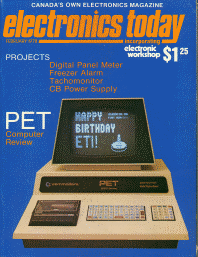 We got one of the first Commodore PETs in Canada to play with! One of the originals with "Chicklets" keyboard and cassette BASIC. My partner-in-crime (and computer afficionado) Mark Czerwinski and I wrote the review and shot the under-the-hood photos. |
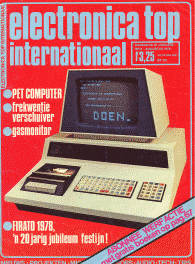 ... and we scored some international fame when several of the other editions picked up the story. Cool! This one is the Netherlands edition. |
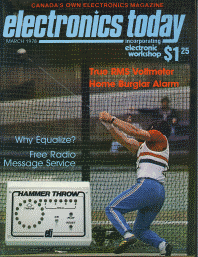 Not every issue can be so exciting... |
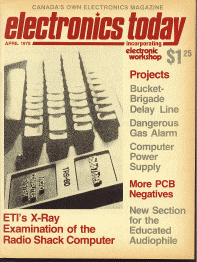 ... particularly when you are working hard on the next computer review. Again we scored a first-in-Canada unit to review... this time the TRS-80. We thought it was rather wimpy. Perhaps we shouldn't have said so, since RS stopped advertising after that. Boy, integrity sure is expensive! |
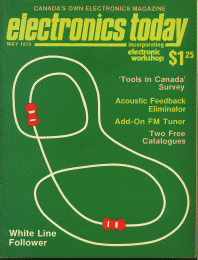 One of our features was catalog inserts, which, for our supplies-starved readers were probably at least as interesting as the articles. The "acoustic feedback eliminator" used a neat frequency-shift design. |
| ETI-Oz was the source for most of our projects. Their lab was home for, amongst others, a prolific project perpetrator Barry Wilkinson (though he rarely received credit), who was also key in the design of the International series of analog music synthesizers (kitted in Oz and UK). Other ETI-Oz associates Kim Ryrie and Peter Vogel were responsible for Australia's legendary Fairlight CMI, the synth that started the sampling era in '79, and was quickly adopted by artists such as Fleetwood Mac, Stevie Wonder, Genesis etc. | ||
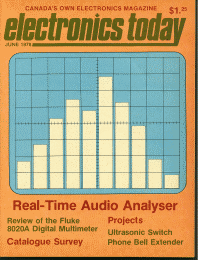 I always liked audio articles. And I still have the Fluke 8020A multimeter we reviewed.
|
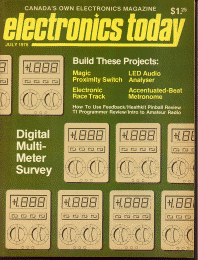 When we compiled a survey we really took is seriously. But they are a huge amount of work to lay out the tables. This was pre- desktop- publishing. The typesetting was all done on an IBM selectric typesetting machine, an monstrous extension of the selectric typewriter that by all rights never should have worked, and frequently didn't. |
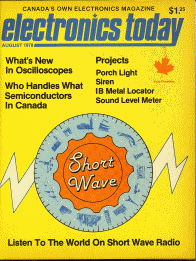 For me, of our topics, shortwave radio was probably the least favorite, but at least we had a pleasant cover. |
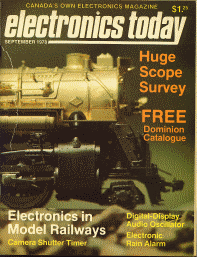 The "Huge Scope Survey" was supposed to be done by a free-lancer... but at the last minute he discovered that this was more work than he realized. So guess who got to do it? This issue also contained the ever-popular catalog from one of Canada's biggest retail electronic's suppliers at the time, Dominion Radio. |
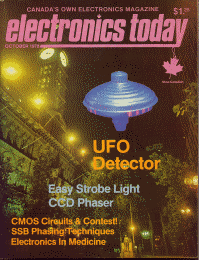 How do you detect a UFO? Well, actually it only detects the magnetic disturbances that UFOs are known to leave in their wake. Or was that mental disturbances? Also, a brief burst of patriotism causes a maple leaf to appear prominently. |
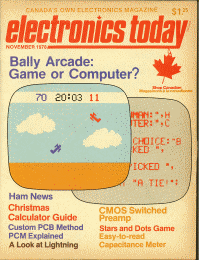 We knew Bally had a really bad idea, but after the RS experience we were less inclined to say so. The maple leaf gets bigger. |
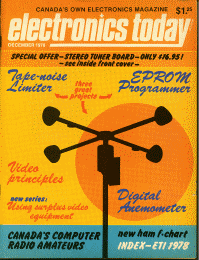 Most notable item: The appearance of Steve Rimmer as video columnist, covering how to get into video on the cheap. (Hot topics: "Selectavision", "Betamax" and "One-inch tape for Experimenters"). Steve has gone on to an illustrious career as software developer and author (including popular titles on PC graphics formats, and Corel Draw.) |
||